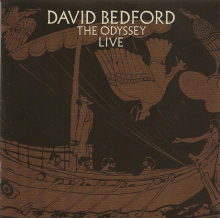MENNO VON BRUCKEN FOCK
THE ODYSSEY LIVE (E)

David Bedford was born in 1937 and passed away in October 2011. He's well-known for his work with Kevin Ayers, Roy Harper and The Edgar Broughton Band, but also for his orchestral works on Mike Olfield's Tubular Bells (1973), Camel's The Snow Goose (1975) and collaborations with for example Propaganda and Enya. He's also known for contributions in the film industry such as The Killing Fields or The Mission. Fortunately he has been able to witness the release on CD of his masterpiece The Odyssey. Performed live in the Royal Albert Hall in 1977, the concert has been broadcasted back then, but has never been heard since. The ultimate fusion between rock music and classical music as it was known, The Odyssey originally was the musical setting for the legendary tale and play by Homer. The show included the Queen's College Choir and the Wine Glass Orchestra. With Bedford on stage there were among others Mike Oldfield (guitar), Jon Lord (synthesizer, ex-Deep Purple), Mike Ratledge (synthesizer, Soft Machine) and Dave Stewart (grand piano, Egg, National Health). Penelope's Shroud is a sort of a prelude, probably one of the first 'ambient' pieces with modest orchestrations and a Moog playing slowly what could be called 'nearly a ladder' missing one note. King Aeolus is one of the most impressive tracks because of the participation of several keyboard players: slow majestic music in the vein of Vangelis with a bit of a 'church feel'. After a short interlude with some roaring sounds and the Moog you get The Phaeacian Games with Mike Oldfield on the guitar. The music could have been from one of the early Oldfield-albums. Oldfield plays mostly ladders on the neck of his guitar and some more appealing melodies. Again the same sort of interlude as in tracks one and three and then keyboards with the Queen's College Choir singing in the sirens. Comparable loops as Oldfield just did, but now far more subtle on the synthesizer with a deep somewhat muffled sound. Piano and organ are added and the whole atmosphere becomes a mix of electronic, church and classical music in a rather challenging intonation. When the guitar joins in there are definitely similarities between The Odyssey and Tubular Bells. The last part of this long track features several keyboards playing solos and melodies. In Scylla And Charybdis there is a slow majestic melody by Moogs in the opening part, followed by a more up-tempo piece featuring piano and synths playing melodies already used, but nevertheless beautiful! Halfway the track some harsh sounds as if heading a nasty storm, then the same melodies from the Penelope's Shroud pieces again in a more harmonious form and with different instrumentation, alternated by a return to the earlier more up-tempo melodies. After another short interlude you get Circe's Island with slow, flowing music while Oldfield is playing melodic leads over chords by organ and orchestra and accompanied by the piano. A more bombastic version of Penelope's Shroud with several keyboards leads to the grand finale: Battle In The Hall with hammering percussion, nicely built up by keyboards and guitar plus choir and orchestra. The pitch keeps changing and gradually the percussion fades away and the album ends with a tour de force by all the keyboards playing beautiful majestic melodies accompanied by the choir and the flutes in the orchestra. Of course Oldfield gets the chance to play the very last notes. As a whole this is definitely a 'symphonic rock meets electronic music' album, more than an album with a lot of classical influences.
David Bedford played a big part in building bridges between symphonic rock and classical music and this release pays tribute to the man who has been quite unique in the world of pop and rock music. In spite of the fact that The Odyssey is a live recording from the mid-seventies, the sound quality is rather poor and more of a bootleg quality. Nevertheless, considering this was the only recording available it seems justifiable to me to release this live performance all the same. Still it's more an album for Oldfield-fans and collectors of symphonic music from the seventies.